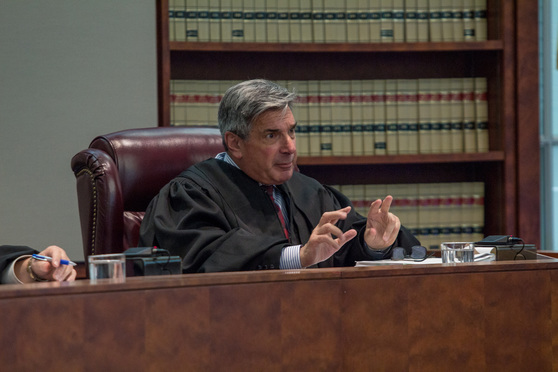Justices Say No Actual Harm Needed to Prove Child Endangerment
"Not one published opinion holds otherwise," Justice Walter Timpone said. "We find no reason to disturb the decades-old sound precedent predicated on the plain language of the statute."
August 09, 2018 at 05:45 PM
3 minute read
 Justice Walter Timpone / Photo by Carmen Natale
Justice Walter Timpone / Photo by Carmen Natale
In order to obtain a conviction for endangering the welfare of a child, prosecutors need not prove that the child sustained actual harm, but only that there was a substantial likelihood that harm could result from the parent's or guardian's action, a divided New Jersey Supreme Court has ruled.
In a 4-3 ruling, the majority said there was abundant support in case law to hold that a showing of actual harm is not mandatory to sustain a conviction under the statute.
Justice Walter Timpone, writing for the majority in State v. Fuqua on Aug. 9, said a trial judge was correct in denying Danyell Fuqua's bid to dismiss the endangering charge based on the contention that no harm came to the six children that were under her care.
“Relying on ample precedent the court held that the state need only prove, and did prove, that a child faced a 'risk' of harm sufficient to convict,” Timpone said.
Chief Justice Stuart Rabner and Justice Barry Albin dissented, in two separate opinions.
According to the decision, Fuqua was the girlfriend of a man, Tyrell Johnson, who was the target of a drug investigation by Middlesex County law enforcement in September 2011. Law enforcement then executed a search warrant on a motel room that December.
In the motel room, officers found marijuana, heroin, pills and other drug paraphernalia, and also present were six children, ages 1 to 13, the ruling said.
Both Johnson and Fuqua were charged with endangering and multiple drug offenses.
Johnson eventually pleaded guilty, but Fuqua opted to go to trial.
After the judge denied her motion to dismiss the endangerment charges, she was convicted and sentenced to six years in prison, according to the court.
The Appellate Division rejected the defense arguments that there had to be a showing of actual harm.
The majority agreed, holding that only a showing of risk of harm was needed.
“Not one published opinion holds otherwise,” Timpone said. “We find no reason to disturb the decades-old sound precedent predicated on the plain language of the statute.”
Timpone said there was a commonsense reason why actual harm need not be a prerequisite for a conviction.
“Children are naturally curious and inquisitive,” Timpone said. “Drugs hauntingly surrounded children's toys and clothing. The easy access to cocaine, heroin and marijuana, and the attraction of brightly colored pills, all created a potentially lethal trap for the children that could have sprung at any moment.”
Rabner, in his dissent, said the Legislature did not make its intent clear when it enacted the statute, and that the courts should therefore give it a narrow interpretation.
Albin said the majority's ruling gives prosecutors license to base a criminal charge on what is a civil law definition of endangerment. Justice Jaynee LaVecchia joined in the dissent.
Fuqua's attorney, Assistant Deputy Public Defender Matthew Astore, said he was disappointed with the ruling. “The court is saying there is no distinction between actual harm and the risk of harm.”
Middlesex County Prosecutor Andrew Carey issued a statement.
“We appreciate the decision from the Supreme Court, which will enable law enforcement statewide to best protect the safety of our children,” Carey said.
This content has been archived. It is available through our partners, LexisNexis® and Bloomberg Law.
To view this content, please continue to their sites.
Not a Lexis Subscriber?
Subscribe Now
Not a Bloomberg Law Subscriber?
Subscribe Now
NOT FOR REPRINT
© 2025 ALM Global, LLC, All Rights Reserved. Request academic re-use from www.copyright.com. All other uses, submit a request to [email protected]. For more information visit Asset & Logo Licensing.
You Might Like
View All

Trending Stories
- 1Troutman Pepper, Claiming Ex-Associate's Firing Was Performance Related, Seeks Summary Judgment in Discrimination Suit
- 2Law Firm Fails to Get Punitive Damages From Ex-Client
- 3Over 700 Residents Near 2023 Derailment Sue Norfolk for More Damages
- 4Decision of the Day: Judge Sanctions Attorney for 'Frivolously' Claiming All Nine Personal Injury Categories in Motor Vehicle Case
- 5Second Judge Blocks Trump Federal Funding Freeze
Who Got The Work
J. Brugh Lower of Gibbons has entered an appearance for industrial equipment supplier Devco Corporation in a pending trademark infringement lawsuit. The suit, accusing the defendant of selling knock-off Graco products, was filed Dec. 18 in New Jersey District Court by Rivkin Radler on behalf of Graco Inc. and Graco Minnesota. The case, assigned to U.S. District Judge Zahid N. Quraishi, is 3:24-cv-11294, Graco Inc. et al v. Devco Corporation.
Who Got The Work
Rebecca Maller-Stein and Kent A. Yalowitz of Arnold & Porter Kaye Scholer have entered their appearances for Hanaco Venture Capital and its executives, Lior Prosor and David Frankel, in a pending securities lawsuit. The action, filed on Dec. 24 in New York Southern District Court by Zell, Aron & Co. on behalf of Goldeneye Advisors, accuses the defendants of negligently and fraudulently managing the plaintiff's $1 million investment. The case, assigned to U.S. District Judge Vernon S. Broderick, is 1:24-cv-09918, Goldeneye Advisors, LLC v. Hanaco Venture Capital, Ltd. et al.
Who Got The Work
Attorneys from A&O Shearman has stepped in as defense counsel for Toronto-Dominion Bank and other defendants in a pending securities class action. The suit, filed Dec. 11 in New York Southern District Court by Bleichmar Fonti & Auld, accuses the defendants of concealing the bank's 'pervasive' deficiencies in regards to its compliance with the Bank Secrecy Act and the quality of its anti-money laundering controls. The case, assigned to U.S. District Judge Arun Subramanian, is 1:24-cv-09445, Gonzalez v. The Toronto-Dominion Bank et al.
Who Got The Work
Crown Castle International, a Pennsylvania company providing shared communications infrastructure, has turned to Luke D. Wolf of Gordon Rees Scully Mansukhani to fend off a pending breach-of-contract lawsuit. The court action, filed Nov. 25 in Michigan Eastern District Court by Hooper Hathaway PC on behalf of The Town Residences LLC, accuses Crown Castle of failing to transfer approximately $30,000 in utility payments from T-Mobile in breach of a roof-top lease and assignment agreement. The case, assigned to U.S. District Judge Susan K. Declercq, is 2:24-cv-13131, The Town Residences LLC v. T-Mobile US, Inc. et al.
Who Got The Work
Wilfred P. Coronato and Daniel M. Schwartz of McCarter & English have stepped in as defense counsel to Electrolux Home Products Inc. in a pending product liability lawsuit. The court action, filed Nov. 26 in New York Eastern District Court by Poulos Lopiccolo PC and Nagel Rice LLP on behalf of David Stern, alleges that the defendant's refrigerators’ drawers and shelving repeatedly break and fall apart within months after purchase. The case, assigned to U.S. District Judge Joan M. Azrack, is 2:24-cv-08204, Stern v. Electrolux Home Products, Inc.
Featured Firms
Law Offices of Gary Martin Hays & Associates, P.C.
(470) 294-1674
Law Offices of Mark E. Salomone
(857) 444-6468
Smith & Hassler
(713) 739-1250








